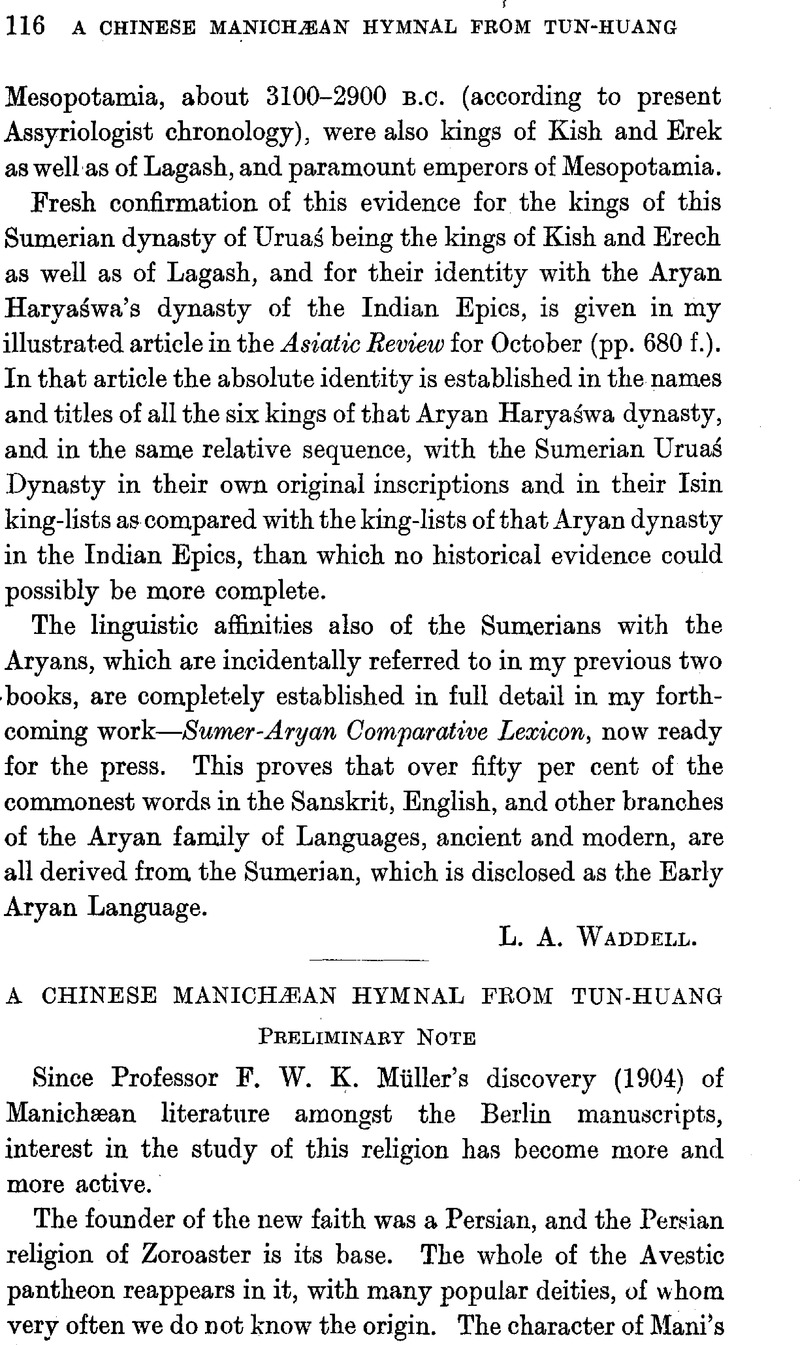No CrossRef data available.
Article contents
A Chinese Manichæan Hymnal from Tun-huang
Published online by Cambridge University Press: 15 March 2011
Abstract

- Type
- Miscellaneous Communications
- Information
- Copyright
- Copyright © The Royal Asiatic Society 1926
References
page 117 note 1 Cf. SirStein's, A.Serindia, Oxford, 1921, pt. ii, p. 922Google Scholar. Yabuki's preliminary report (Japanese) Tonkō-chihō-shutsu kosha-butten kaisetsu moku roku, Tokyo, 1917, mentioned there, has not been accessible to us.
page 119 note 1 Kindly translated from German into English by Professor A. v. Le Coq.
page 120 note 1 Chavannes-Pelliot, Traité Manichéen (Journ. As., 1911) ![]() shanmu, good mother ; in North-Western Iranian orδov
shanmu, good mother ; in North-Western Iranian orδov ![]() n måδ, mother of the Pious, in South-Western Iranian m
n måδ, mother of the Pious, in South-Western Iranian m ![]() δor ē zīndoy
δor ē zīndoy![]() n, mother of the Living.
n, mother of the Living.
page 120 note 2 In North-Western Iranian va ![]() δ žīvondoy, Living Spirit. Other names. of the spiritus vivens are
δ žīvondoy, Living Spirit. Other names. of the spiritus vivens are ![]() tsing fêng, pure Wind,
tsing fêng, pure Wind, ![]() tsingfa fêng, pure Wind of Religion. The Mother of Life and the Living spirit. dwell in the Palace of the Sun, according to the fragment T.M. 291, in v. Le Coq, Türkische Manichaica, iii, Abhandl. d. Akad. d. Wiss., Berlin, 1922, Nr. 2, p. 7.
tsingfa fêng, pure Wind of Religion. The Mother of Life and the Living spirit. dwell in the Palace of the Sun, according to the fragment T.M. 291, in v. Le Coq, Türkische Manichaica, iii, Abhandl. d. Akad. d. Wiss., Berlin, 1922, Nr. 2, p. 7.
page 120 note 3 The five receiving Lights occur several times as the five receiving Messengers of Light, ![]() . For the combined invocation of these divinities cf. M. 4, p. 5 (South-Western dialect), F. W. K. Müller,. Handschriftenreste, ii, p. 55, uβ
. For the combined invocation of these divinities cf. M. 4, p. 5 (South-Western dialect), F. W. K. Müller,. Handschriftenreste, ii, p. 55, uβ![]() γ zīndoy
γ zīndoy![]() n måδor Mihr yozδ o homēs frēstoy
n måδor Mihr yozδ o homēs frēstoy![]() n ponz uδ dvåzδoh, with the Mother of Living, the god Mihr, together with the Messengers five and twelve.
n ponz uδ dvåzδoh, with the Mother of Living, the god Mihr, together with the Messengers five and twelve.
page 121 note 1 i.e., the body : cf. 1. 19b ![]() “Pray, deliver from the carnal body, the poisonous ocean of fire”.
“Pray, deliver from the carnal body, the poisonous ocean of fire”.
page 121 note 2 This meaning of the final words is well attested by & number of Southwestern, North-Western, and Sogdian equivalents.
page 121 note 3 This character looks more like ![]() p‘iao, but this reading would be without any sense.
p‘iao, but this reading would be without any sense.
page 121 note 4 Old pronunciation reconstructed by Karlgren, B., Analytic Dictionary of Chinese, 1923Google Scholar.




